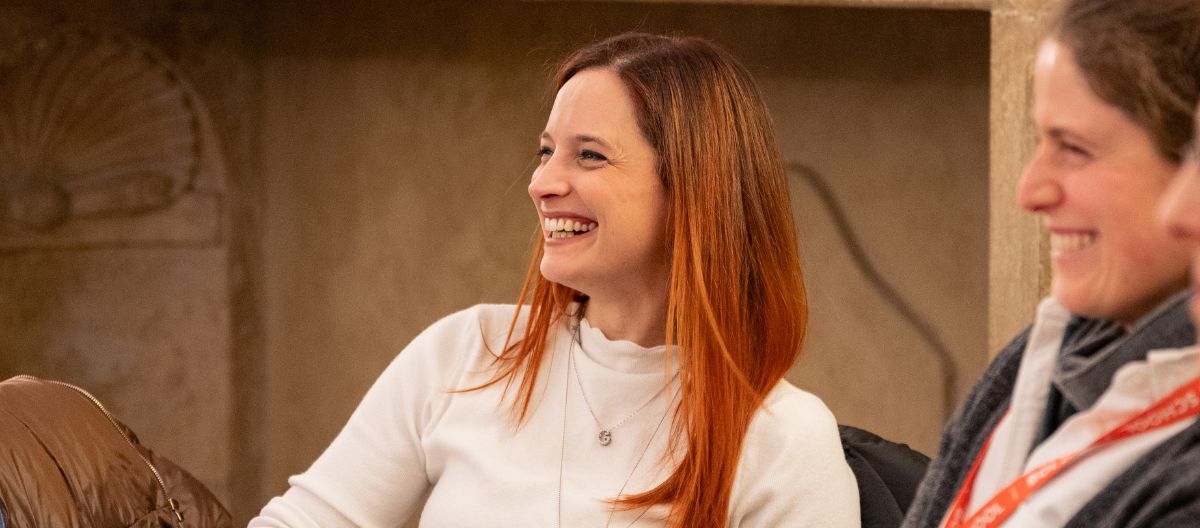
“Valuing people and the environment they belong to”: the experience of Giulia Manzini, Alumna of the Executive Master in Sustainability Management
30 September 2025From chemistry to the food sector, and then to sustainability: Giulia Manzini’s path has not been linear, but it has always been guided by a common thread—her desire to value both people and the environment.
After earning a degree in chemistry and building a career as an Area Manager in the food retail industry, she decided to take a leap forward, enrolling in the Executive Master in Sustainability Management at Bologna Business School to transform an unfulfilled dream into a new professional direction. Today, she is pursuing a personal project dedicated to educating younger generations and shares how her education and her choices shaped this turning point.
Tell us about your professional background and your need to change perspective: what led you to question your career path? What kind of transition did you want to activate?
To answer this question, I need to start from the beginning, with my degree in chemistry in the early 2000s. My goal was to specialize in environmental and territorial sciences, in order to truly enhance the immense natural heritage to which we belong and that we often take for granted. This aspiration remained unfulfilled, but it never completely faded. My subsequent professional experience, which led me to become an Area Manager for a company operating in the food retail sector, helped me realize that it is equally important to value the social heritage that makes up our communities. That’s when my desire returned, stronger than ever, and was reinforced by new awareness: valuing both people and the environment they are part of.
Changing sectors is never easy. What were your initial doubts or fears? And what helped you overcome them?
My main concern was whether a company in a completely different sector from the one I had always worked in would give me an opportunity. I was already over 40 when I enrolled in the Master, and I was terrified at the idea of taking such a leap into the unknown. The job market is complex, often complicated, and shaped by rigidities and stereotypes. However, I drew strength from my determination, my confidence in my abilities, and my conviction that sustainability is the path to the future. A path, moreover, that is being defined right now; I knew I had to be part of this paradigm shift.
How did the Master at BBS help you sharpen your goals and achieve them? Was there a moment, a project, or a lesson that had a particular impact on you?
The Executive Master in Sustainability Transition Management was fundamental for my development in many ways. It certainly helped me organize the knowledge I already had, but above all, it deepened, enriched, inspired, and consolidated it. Then something wonderful happened that confirmed I had made the right choice: I couldn’t wait to learn more, to talk about it, and to be part of it… and at a certain point, I realized what I truly enjoyed and what stimulated me the most. There were many memorable moments; I recall with great pleasure several courses and professors. But perhaps the most important was the teamwork in the course Planning and launching green and sustainable businesses with Professor Giuliani, when my project work was born: the board game for children Sustainability Adventures, which I am still pursuing today.
What prospects do you see today for those who want to contribute to the sustainable transition? What advice would you give to someone considering a path similar to yours?
The prospect I see today is also the advice I would give: perseverance. This is a very difficult and critical moment, with multiple challenges to face, many of them more urgent than the 2050 or 2100 transition deadlines. We cannot ignore the global context, nor can we expect today’s immediate issues to be put aside in the name of sustainable transition. Yet, we must not forget the importance of what sustainability represents. My personal view is that we must approach the future with critical intelligence and a willingness to step up, without fearing the possibility of taking a step back—whether personal or professional—if this means regrouping and moving forward together, united by new goals.
